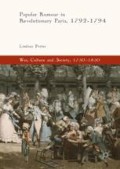Abstract
“Rumour, Denunciation and Terror”, pursues this argument to its conclusion, examining how rumour became an inextricable part of the climate of suspicion and denunciation that existed during year II. Many arrests were based on hearsay, rumour and innuendo, which were later cited as evidence at Revolutionary tribunals. The use of historical evidence, retrofitted and reinterpreted through an increasingly radicalised lens, led to convictions for behaviour that, in the early years of the Revolution, would not have been criminal. These shifting perspectives are reinforced by ever-elastic and mutable definitions of “suspect”, ultimately reflecting the instability of language itself.
Author information
Authors and Affiliations
Corresponding author
Rights and permissions
Copyright information
© 2017 The Author(s)
About this chapter
Cite this chapter
Porter, L. (2017). Rumour, Denunciation and Terror. In: Popular Rumour in Revolutionary Paris, 1792-1794. War, Culture and Society, 1750-1850. Palgrave Macmillan, Cham. https://doi.org/10.1007/978-3-319-56967-3_7
Download citation
DOI: https://doi.org/10.1007/978-3-319-56967-3_7
Published:
Publisher Name: Palgrave Macmillan, Cham
Print ISBN: 978-3-319-56966-6
Online ISBN: 978-3-319-56967-3
eBook Packages: HistoryHistory (R0)

